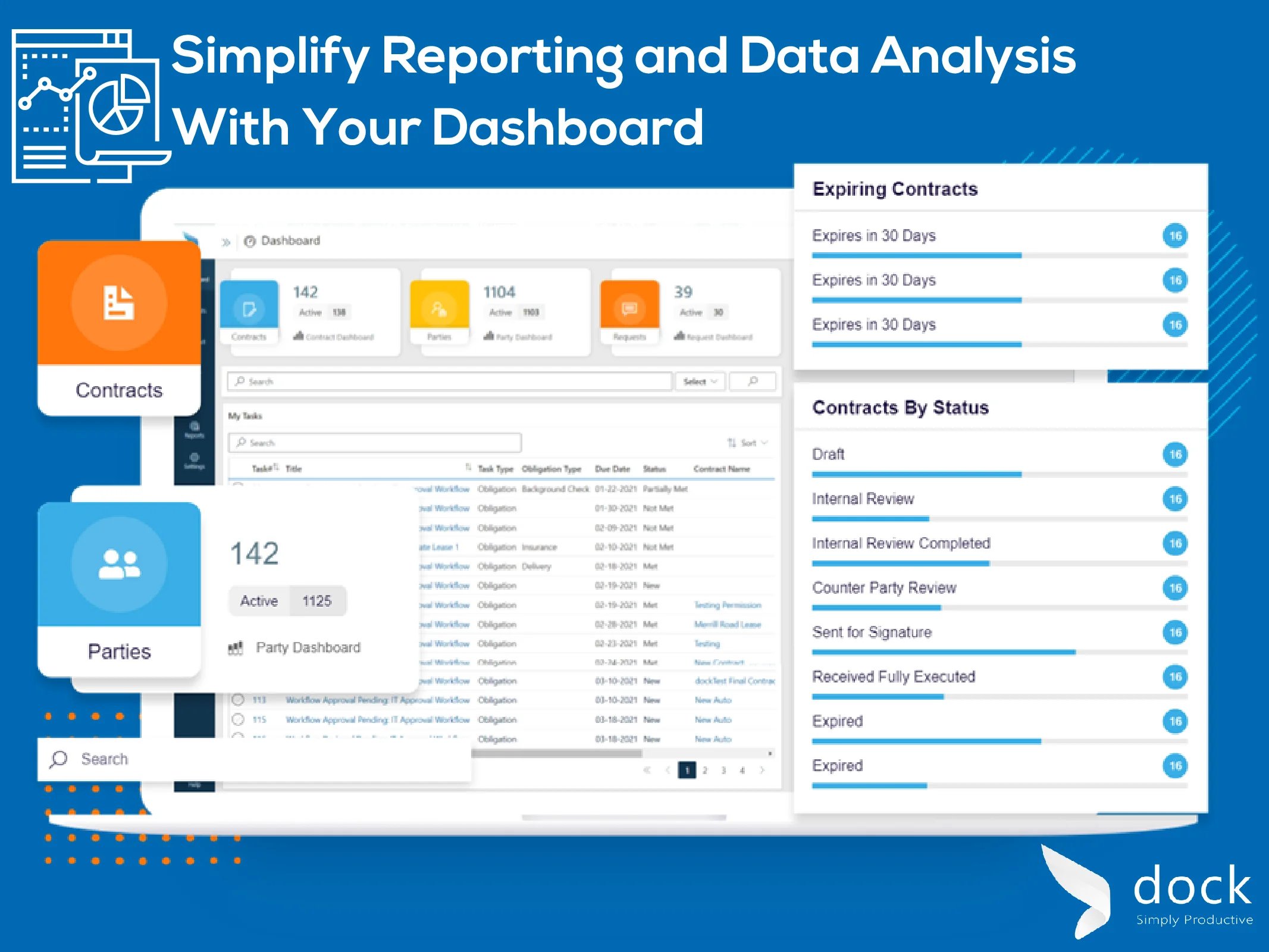
A Starter Manual to Contract Tracking Software
Contract management is an ever-evolving process, where strategy is required throughout each phase of the contract lifecycle – from the very beginning at contract intake to the very end at expiry or renewal. Oftentimes after a contract is signed and fully executed, the contract and associated documents are stored and forgotten about, only to be searched for once an issue arises or the contract expires. For contract management success, it’s imperative that contract managers and administrators prioritize ongoing management of each agreement to ensure that deliverables and terms are followed through on. With appropriate contract tracking software, you can do just that.
Subpar contract management software can impede your ability to capture new contract opportunities and deals. Rather than settle for a system that increases inefficiencies and bottlenecks, you can adopt a risk-preventative, compliance-minded, and collaboration-friendly solution capable of propelling contract management success.
Today, we’ll discuss all things contract tracking and monitoring. We’ll give an overview of how contract repositories can support you in these activities, as well as discuss which contract data to leverage to for reviews of KPI achievements and to maximize your tracking procedures.
Content-
- Best Practices for Contract Tracking and Monitoring
- What is Contract Tracking
- Contract Tracking, The Key to Boosting Visibility.
- Pain Points of Poor Contract Tracking
- Business Advantages of Contract Tracking
- Key Contract Tracking Tools
- Conclusion
Best Practices for Contract Tracking and Monitoring
1. Use a Centralized Contract Repository
With a digital, centralized repository, you can easily build contract drafts from preapproved contract templates and clauses. This results in the rapid creation of accurate, compliant contracts. Leveraging a digital repository that centralizes all of your contracts offers an organized, single source of truth to your team regarding where contracts are located. In your repository, your team can use advanced text-based searches and customizable filters to easily retrieve commonly used contract types. This can help reduce delays in finding the right contracts at the times you need them most, such as during negotiations and reviews.
Traditional contract storage by way of physical copies in filing cabinets, shared drives, email chains, and desktops are prone to risk, data leakage, and missing contracts. A centralized digital repository supports you with cloud-secure storage and instant access to your contracts at all times. Within your repository, you select exact metadata points to track for a given contract or group of contracts. For example, obligations, compliance requirements, renewal dates, negotiation dates, deliverables, termination conditions, performance indicators (KPIs), risky clauses, or other critical and time-sensitive information are common data points that you can efficiently track in your software solution.
Companies that automate their contract storage with a digital contract repository experience gains in workplace efficiency and contract risk mitigation, most especially for organizations that consistently work with a high volume of complex contracts.
2. Refine Your Contract Tracking Method
Productive contract lifecycle management largely hinges on the efficiency of contract task management. Contract managers should strategize which contract metadata to prioritize in their contract tracking procedures. For example, they may elect to summarize key data points including contract term start and end dates, renewal dates, expiry dates, contract value, obligations, payment deadlines, and more. In this manner, you increase visibility over your agreements to cultivate a proactive culture surrounding your contracts.
A successful contract manager is a proactive contract manager. We highly recommend configuring automated contract reminders to be sent off to relevant stakeholders and employees to keep tabs on upcoming key dates and time-sensitive contract management tasks and responsibilities. Do you often forget about auto-renewing contracts or expiring contracts? Automated reminders can seriously help. To stay proactive, routinely review your contracts and audit your contract management practices. Contract reviews will help you mitigate risks and implement corrective, preventative action before potential risk manifest into major problems. Experts in contract management commonly note that organizations should work a month ahead of time on contracts due for expiration. In this manner, you have a sufficient amount of time to adequately prepare for renegotiation or termination, meaning you can get the most advantageous deal for your company.
![]()
3. Communicate with Stakeholders
Contracts always involve two or more parties with a financial stake in the agreement. Contract managers are obligated to stay in communication with stakeholders to ensure expectations regarding the contract are understood and that any queries and clarifications are swiftly addressed.
Here’s a list of a couple of things to communicate to your stakeholders:
- Contract deadlines
- Renewal dates
- Payment due dates
- Deliverables
- Obligations
- KPIs (Key Performance Indicators)
In terms of contract performance, you should speak with your stakeholders about the expectations of each contract and how they are expected to perform. When a contract is not meeting performance markers, you can collaboratively review your contracts and make necessary changes. In addition, you’ll benefit from documenting a detailed timeline of the changes made to each contract (this can also be found via audit trails.)
4. Schedule Ongoing Contract Reviews
The contract lifecycle doesn’t end at signing. With consistent contract reviews, you can pinpoint noncompliance and take immediate action to correct the course of your agreements. This might look like the addition, omission, or editing of a risky clause. Reviews also increase organizational awareness of deadlines like auto-renewals and expirations.
What is Contract Tracking Software?
Contract tracking software enables one to identify where within the contract lifecycle a contract is located. Understanding which phase a contract is in within its lifecycle can help you decide which next steps to take on the contract at hand. In this manner, you can appropriately relay contract information to your teams and communicate what actions need to be taken next on a contract or group of contracts.
Effective contract lifecycle management requires intentional supervision of each agreement pre- and post-signature to ensure that risks are appropriately managed. Subpar risk management can result in reputational damages and other expensive repercussions.
For companies that work with high contract volumes, contract tracking can prove to be a complicated task. However, contract management software can support your teams with effective contract tracking capabilities to enhance contract risk prevention, increase security, and organize key dates.
To successfully maintain a demanding contract portfolio, contract tracking software is an absolute must for visibility into contract lifecycles.
Contract Tracking Software, The Key to Boosting Visibility.
Without contract visibility, you lose track of where within the lifecycle a contract is located. You might also lose your contracts altogether! Visibility in contract management is key to creating clear communication surrounding your contracts. In this way, contract managers can learn exactly where a contract is sitting within pre-renewal or within other phases by having real-time contract data readily accessible.

Pain Points of Poor Contract Tracking
Subpar contract tracking results in the following:
- Confusion regarding where contracts are located
- Inadequate communication
- The tension between internal teams
- Increased risks
- Contract loss and misplacement
Business Advantages of Contract Tracking Software
Efficient contract tracking software results in the following business advantages:
- Increased transparency of contract activities
- Organizational awareness of key dates and contract statuses
- Enhanced collaboration
- Improved task management
- Faster contract approvals
While manual contract management might be able to cut it for smaller companies or companies with minuscule contract portfolios, a manual system is ill-equipped for tracking all the complex details and dates found within a larger contract portfolio. Selecting contract management software with built-in contract tracking capabilities (proactive dashboards, customized reporting, automated reminders, etc.) will optimize your contract management strategies with cloud security, contract intelligence, and automation.
Key Contract Tracking Tools
Contract management software offers premiere tools to support contract tracking. With the following tools, you’ll boost visibility and have contract metadata, performance, and statuses readily available for your teams to glean insights.
Look for the following features when selecting a contract management solution:
- Clause library of preapproved, compliant clauses
- Audit trails
- Cloud-secure, SharePoint-based digital repository
- System compatibility with all attachment types
- Award tracking
- Vendor compliance monitoring
- Vendor performance scorecards
- Custom metadata fields
- Automated notifications
- Flexible automated workflows
- Electronic signature integrations
Conclusion
With best-in-class contract management software inclusive of contract tracking capabilities, you can streamline and optimize contract transparency, internal communication, and contract results. Thanks to contract tracking, you can improve risk mitigation while saving time and cutting costs.
Now, you can make the status and performance of your contracts readily available, on demand for your stakeholders, providing them with contract data in real time. Wondering where an employment contract is located within its lifecycle? Find the answer in just seconds. For the best results in contract lifecycle management, adopt a contract tracking software built to track any agreement or clause, and you’ll gain more secure, risk-mitigative contract lifecycle management.
Learn more about our Dock 365 Contract Management System here.
Book a Live demo
Schedule a live demo of Dock 365's Contract Management Software instantly.

Written by Lindsey Paulk
Lindsey Paulk is a Content Writer in Jacksonville, Florida that specializes in digitally communicating all-things contract management.





